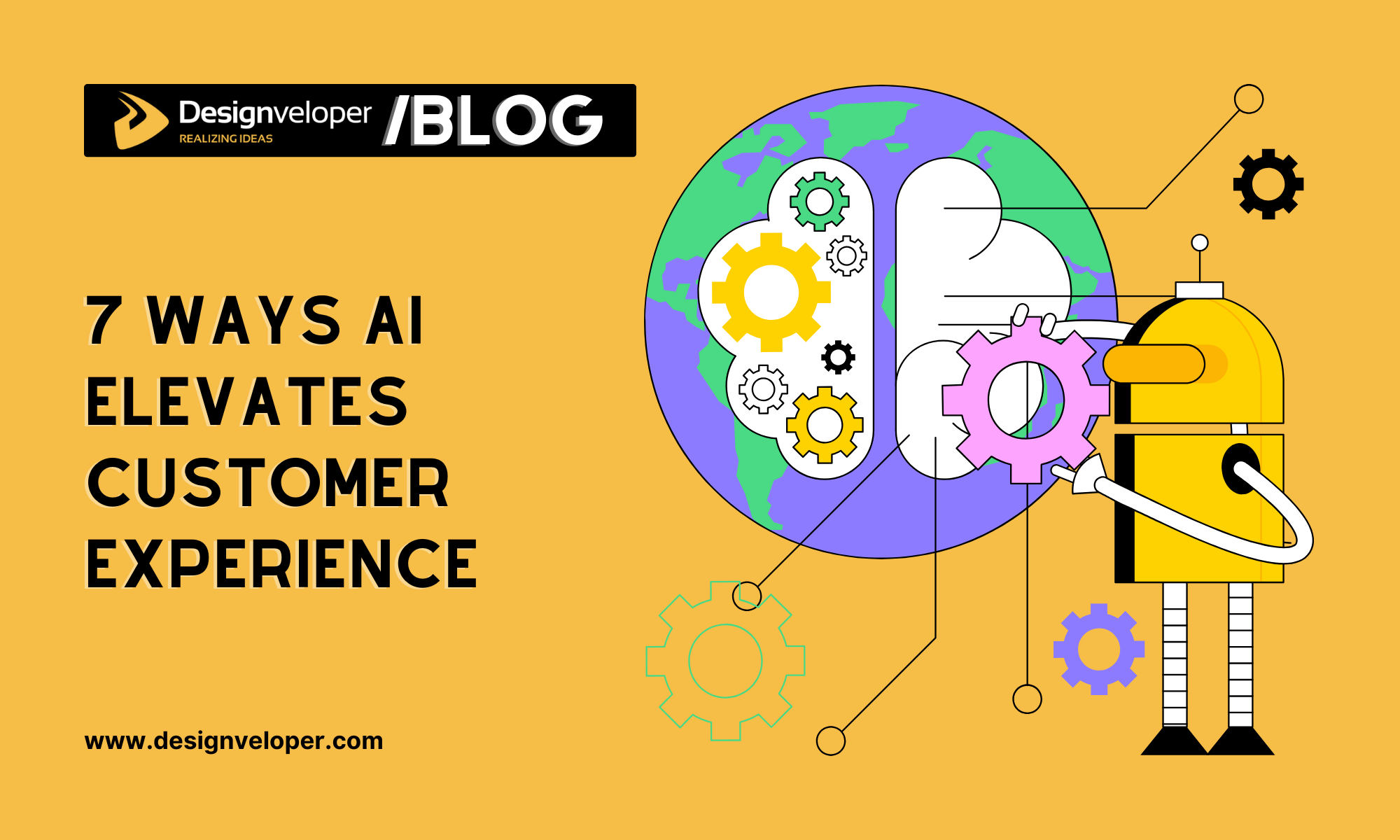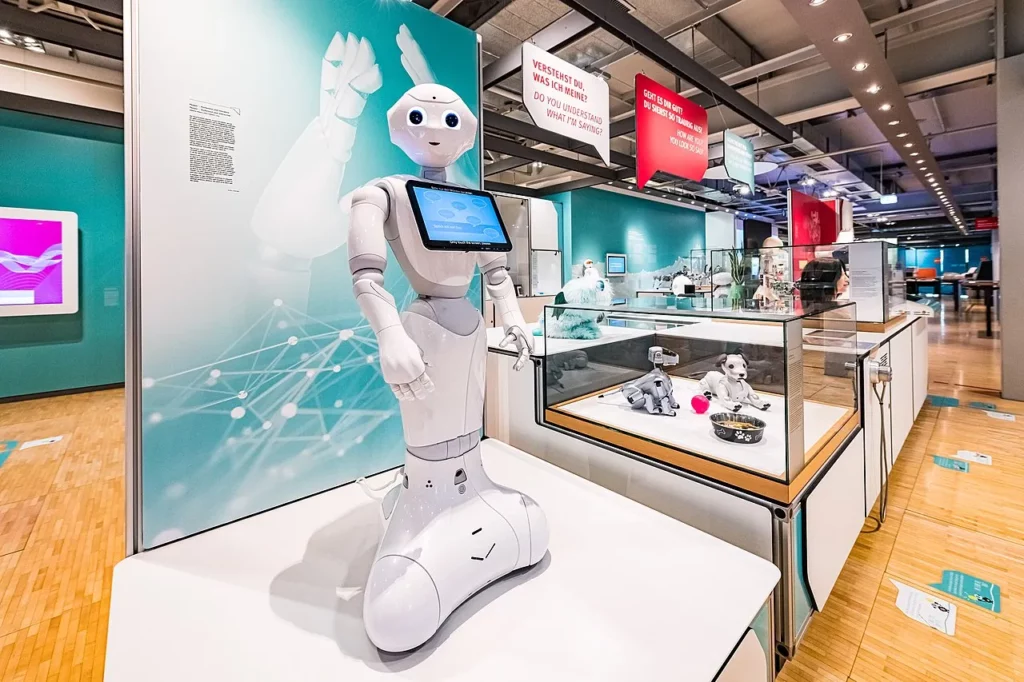7 Ways AI Elevates Customer Experience for 2025

AI elevates customer experiences in 2025 by transforming how businesses interact with their customers. According to new statistics, 73 percent of consumers say customer experience (CX) is an important factor. To meet these expectations, companies are investing heavily in AI. For example, 86% of buyers will pay more for a better experience. AI is able to provide personal interactions to guests, and response to their needs instantaneously: that is the shift.
Amazon’s recommendation algorithm and Apple’s intuitive support systems are examples of AI influence. These innovations turn purchasing into something pleasant, easy and that you look forward to — phrasing that also suggests customer loyalty. Greater adoption of AI by businesses simply means that the future of customer experience is looking bright.
The Importance of AI for Customer Experience in 2025
AI is set to take customer experience (CX) to the next level in 2025. Businesses are leaning more and more towards AI to provide personalized, efficient and engaging interactions with customers. A Forrester research report states that companies with superior CX grow revenue 5.1 times faster than their competitors. This enables us to understand how important AI is in improving customer satisfaction and business growth.
The highlight is AI driven personalization. By using data analytics and machine learning, companies can customize interactions to match each customer’s unique preferences. All this leads to another stat: PwC found that 73% of consumers consider CX a key factor in their purchasing decisions. It reinforces the need to give your customers stellar experiences to keep and gain them.

On that account , AI is also helping businesses to get out of the CX paradox. Despite fewer negative interactions, consumers are quicker to cut spending after poor experiences. Using AI tools, companies can hear every voice and have the ability to respond with impact – keeping the customer heard and addressing feedback promptly and effectively. By this proactive customer care approach, customers become more trusting and develop loyalty towards the business.
Moreover, AI is changing customer support. Chatbots and virtual assistants can be leveraged to deliver advanced, accurate responses in speed at a remarkable support experience. In addition to increasing customer satisfaction, it enables human agents to spend more time on the more complex tasks.
Across the board, AI is improving customer experiences by improving content to be more personalized, efficient, and responsive. With continuing adoption of AI technologies by businesses, the future of CX appears bright and AI is a key player in defining how these companies will interact with customers in future.
7 Ways AI Will Elevate Customer Experience in 2025
We are facing an unprecedented revolution of customer experience (CX) by AI in 2025. Recent reports show that 73% of consumers evaluate CX as a key decision parameter in their purchasing choice. In other words, businesses will have to leverage AI to meet—and in most cases surpass—customer expectations. For example, Amazon’s recommendation algorithms as well as Apple’s intuitive interfaces are personalization driven by AI, which make customers satisfied.
In case, 86% of buyers are willing to pay more for a great experience. In fact, companies like Ritz-Carlton and Tesla have led the way by leveraging AI to build more personalized and luxurious experiences. Forrester research finds that AI integration boosts CX metrics – and this trend is supported by more proof.
Moreover, AI promises to cut costs and enhance efficiency as 60 percent of support leaders believe AI will reduce the cost of support over the next five years. For example, Chat GPT or any other AI Chat Bot can resolve customer queries quickly and effectively.
The bottom line is, AI is not just a ‘trend’ for 2025, it is a must for businesses who aspire to thrive in 2025. When companies embrace AI, they can develop loyal and growing customer relationships through memorable and personalized, efficient experiences.
Personalization at Scale
AI elevates customer experiences by offering personalized interactions at scale. In other words, businesses can craft their services to customers’ tastes regardless of the size of the customer base. McKinsey says that 71% of consumers expect companies to know about them and to serve them relevant advertising and offers. As businesses are again asked to engage with their selected customers, expectation pushes the organizations to use AI technologies in their engagement process.
We can achieve this personalization with the help of Generative AI. It utilizes machine learning algorithms to delve into the large datasets and spot the trends in user behavior. For example, ecommerce platforms use AI to guess what people will like based on their browsing history and purchasing patterns. It enriches the shoppers’ experience and improves sales.
Plus, personalization driven by AI doesn’t stop at ecommerce. AI in the streaming services such as Netflix uses AI for making suggestions to movies or shows as per the individual viewing habits. Keeping users engaged is the key and ensures a better experience at the end for users. Also, to provide personalized financial advice and investment recommendations, financial institutions make use of AI.
AI has a considerable effect on customer experience. IBM reported that revenue for companies that personalize content using AI has increased by 40 percent compared to those that don’t. This presents the need for organizations to include AI as a part of their customer service strategy.
In conclusion, AI elevates customer experiences by enabling businesses to provide personalized services at scale. This not only somehow meet the customer expectation, yet it is good for business growth and the customer itself.
AI-Driven Customer Support
In 2025, AI driven customer support will revolutionize how businesses connect with their customers. AI elevates customer experiences by providing faster, more accurate, and personalized responses. A Gartner survey indicates that 85% of customer service leaders will look into or pilot conversational generative AI solutions this year. To improve efficiency and customer satisfaction, this shift is occurring.
A good example is Moen, which swapped out its paper based workflows for cloud based customer service software that came integrated with AI. This has streamlined operations and enhanced service quality. Also, 68% of consumers say AI should be on par (or offered the same level of support) compared to human agents. That’s putting pressure on companies to tap into AI technology that can do repetitive work, and even work 24/7.

In addition, 79% of Indian companies intend to bolster AI spending by 2025 in customer service, in line with the world’s AI usage in customer service. Indian companies are leading the way when it comes to AI integration with 88% of IT and customer service professionals considering AI chatbots essential.
To put simply, customer support driven by AI is not a trend, it is a necessity for businesses who do not want to be left behind in the game and cope with the ever growing customer demands. Companies are able to offer great service, achieve cost reductions and generally improve operational efficiency by utilizing AI.
Predictive Analytics
In 2025, we will see customer experience revolutionized by predictive analytics. AI analyzes vast amounts of information to predict customer behaviour and preferences with startling accuracy. It enables businesses to tailor the experience they deliver, tailored around an individual’s needs. According to McKinsey, successful personalization initiatives can lead to a 20 percent increase in customer satisfaction, for example.
Additionally, it is shown in CRM that 75% of leaders using AI indicate that it helps to standardize response times and helps to provide support quickly and properly to the customer. This is important because 71 percent of customers expect personal experiences, and 76 percent get frustrated when they don’t get them. By using predictive analytics companies are able to avoid these pitfalls and increase customer loyalty.
In retail, AI powered predictive analytics provides real time and personalized discounts based on in store behavior. It boosts the sales, and also enhances the shopping experience. Genesys forecasts that retailers with good customer data and loyalty programs will be at the head of the pack, by integrating these seamless personalized experiences.
In summary, predictive analytics will be a game changer for customer experience in 2025 as they can estimate customer requirements and provide customized solutions. By being proactive it led to deep and valuable customer relationships and business success.
Sentiment Analysis
Sentiment analysis is a powerful tool based on AI to analyse a user’s emotions (sentiment) and opinion. Through review, social media, and customer feedback text data analysis businesses can gather an immense amount of knowledge about customer satisfaction and brand perception.
A Gartner report revealed that by 2025, customer sentiment will influence more than 80 percent of enterprise decision making processes. The growing importance of sentiment analysis in reframing the business strategies of organizations emerges from this.
For example, sentiment analysis has been used by companies such as British Airways and Gousto to improve the customer experience. They analyzed customer feedback to ascertain what are the pain points of customers and solved them by fixing them fast resulting in higher customer satisfaction.
Understanding what resonates with your audience with the help of sentiment analysis can actually help businesses customize their marketing strategies and provide more effective customer services. More personalized interactions and stronger relationships with customers are received, because of that.
Companies can use sentiment analysis AI to respond to customer feedback in real time and respond immediately to problems. In addition to this, it increases customer satisfaction and eventually helps create brand loyalty. Thus, in 2025, sentiment analysis based on AI is changing the way organizations communicate with their users and turning into a must have instrument for enhancing clients’ experience.
Seamless Omnichannel Experiences
AI also elevates customer experiences by creating seamless omnichannel interactions. With the right data in hand, customers can interact with a brand across multiple channels—web sites, apps, social media, in store—and get the same consistent and personalized experience. As per a McKinsey report, organisations that deliver a seamless omnichannel are what directly lead businesses to customer delight and loyalty.
For example, if a customer parks their virtual shopping cart in an online store, they may be sent a reminder or their cart may be constituted with a discount offer either via email or their mobile app. The data synchronization of these ensures that customer preference is shared across platforms so that these can be synchronized up to personalize better. McKinsey’s study data reveals that 80% of the customers now demand this customer –centric approach.
Additionally, with cloud based customer service software that work hand in hand with their marketing and commerce, companies like Moen have come to be successful. Service agents get quick and complete access to customer information so they can have a smooth and consistent experience across touchpoints.
Through the use of AI, businesses can dynamically solve customer problems, be able to personalize conversations with their customers and create deeper loyalty. An approach such as this not only reduces customer frustration but optimizes operations and grows revenues.
Proactive Customer Engagement
In 2025, another way AI elevates customer experiences is by enabling proactive customer engagement. This means that this approach entails knowing what customers need and how to serve them before they even raise a need. A report by Sprinklr found that, among executives in contact centers, 67 percent chose contextualized customer engagement as the outcome of generative AI that would have the most impact.

For example, the fulfillment of AI through Starbucks’s application of AI enables the analysis of purchase history and preferences of preferences which can then be used to provide personalized recommendations through loyalty programs. As a result, companies attract higher customer satisfaction and loyalty by preparation: proactive engagement. On this front, Sephora offers clients an AI virtual assistant allowing clients to pick products according to their preferences.
Businesses can serve timely and relevant interactions by using AI and make customers feel understood and valued. Not only will customer satisfaction improve but loyalty and retention will also be driven. So, companies adopting a proactive customer engagement strategy have greater chances of winning over a competitive market.
Smart CRM Systems
AI elevates customer experiences by transforming Customer Relationship Management (CRM) systems. Now, these systems exploit state-of-the-art AI technologies to provide personalised interactions, and to manage operations.
At the very top of the generative AI stack, we see CRMs powered by generative AI. For instance, Salesforce Einstein uses AI to offer customized responses and forecast customer behavior. As a result it allows to create more efficient customer interactions with a higher level of customer satisfaction.
Another key trend is hyper-personalization. CRMs that look at real time data can provide better and more personalized solutions and communication for the customers as they know what the individual customer will prefer. Such personalization at this level leads to improved customer loyalty and engagement.
In addition, AI powered analytics generate actionable insights for businesses to take data driven decisions. According to reports, more than half of businesses will use generative AI in their CRM by 2025. It is anticipated that this shift will increase efficiency and customer engagement.
In a nutshell, AI smart CRM systems are reinventing how customers are consoled by delivering personalized interactions, predictive insights, and well oiled operations. Putting it slightly differently, businesses that are early adopters (and use these technologies in a meaningful way) will achieve higher customer satisfaction and loyalty.
Conclusion
By 2025, AI will have pretty much changed customer experiences for good, making them more personalized, efficient, and fun. We know firsthand how this transformation happens in different industries. With AI driven personalization businesses can ensure memorable interactions time after time again.
With businesses pouring money into AI or employing services from app development firms such as Designveloper, it is bound to increase customer satisfaction and loyalty. Recent statistics also show that 73% of consumers say customer experience is an important part of the purchasing decision, and 86% are willing to pay more for a good experience. Companies can fulfil such expectations by embracing AI and getting ahead of the competition.

















































